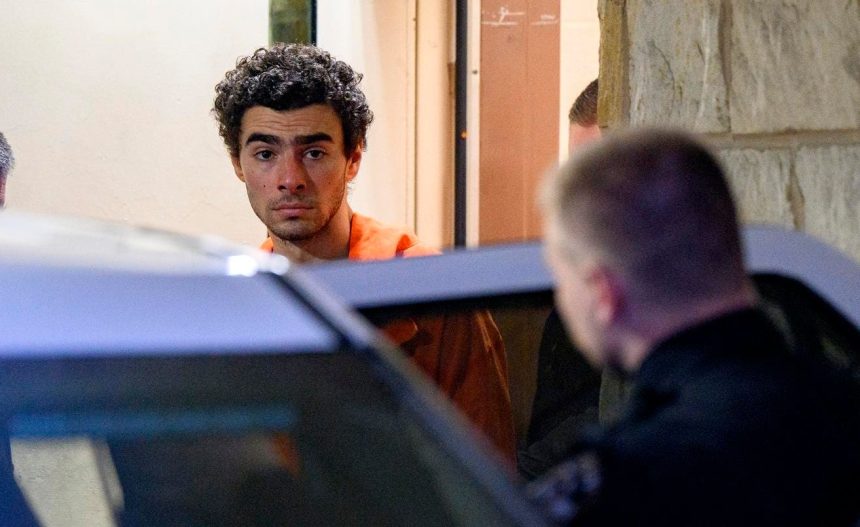The alleged murder of Brian Thompson, a UnitedHealthcare executive, outside a New York City Hilton hotel has ignited a firestorm of controversy, fueled by a complex interplay of online fundraising, public perception, and the simmering discontent directed at the American healthcare system. Luigi Mangione, the accused shooter, has become an unlikely focal point for this discontent, with some viewing him as a symbol of resistance against corporate greed, while others condemn the violence and the subsequent glorification of the alleged perpetrator. This multifaceted narrative underscores the volatile intersection of individual grievances, social media amplification, and the ongoing debate surrounding healthcare accessibility and affordability.
At the heart of the controversy is a fundraising campaign initiated by a group calling itself the December 4th Legal Committee. This group, utilizing the Christian crowdfunding platform GiveSendGo, has successfully raised over $100,000 for Mangione’s legal defense, exceeding half of their $200,000 target. While the committee insists it does not condone violence, emphasizing its belief in the right to fair legal representation, the campaign has drawn sharp criticism for seemingly capitalizing on a tragic event and potentially emboldening similar actions. The committee has stated that if Mangione refuses the funds, they will be redirected to other individuals they deem “political prisoners” facing “politicized charges,” further highlighting their perceived alignment with anti-establishment sentiment. This stance adds another layer of complexity to the narrative, intertwining the murder case with broader political grievances.
The fundraising landscape is further complicated by the stark contrast between GiveSendGo’s decision to host the campaign and GoFundMe’s removal of similar efforts. GiveSendGo, often seen as a haven for campaigns rejected by mainstream platforms, defended its decision by citing Mangione’s presumed innocence until proven guilty. Conversely, GoFundMe, adhering to its policy against fundraising for defendants of violent crimes, has taken down multiple campaigns seeking to support Mangione’s legal defense. This divergence in approach reflects the ongoing debate regarding platform responsibility and the delicate balance between free speech and the potential for enabling harmful activities. The differing responses also highlight the growing polarization of online spaces, with alternative platforms like GiveSendGo catering to communities often marginalized by mainstream platforms.
Beyond fundraising, the case has sparked a wave of online activity, ranging from expressions of support for Mangione to the creation and sale of merchandise bearing slogans related to the incident. Platforms like Reddit, Amazon, and Etsy have taken action to remove content and products deemed to be glorifying violence or exploiting the tragedy. This proactive approach by online platforms underscores the growing awareness of their role in shaping public discourse and the potential for their services to be misused for promoting harmful ideologies. The rapid dissemination of information and the ease with which merchandise can be created and distributed online present a significant challenge in managing the narrative surrounding such events.
The legal ramifications of the case are also evolving, with Mangione’s Pennsylvania lawyer expressing reservations about accepting funds from the online campaign. This hesitation, stemming from ethical concerns, further complicates the already fraught situation. Meanwhile, Manhattan District Attorney Alvin Bragg has strongly condemned the public support for Mangione, characterizing it as “abhorrent” and “deeply disturbing.” This condemnation reflects the broader societal concern regarding the potential for violence to be normalized or even celebrated, particularly in the context of online echo chambers where extremist views can be amplified.
The narrative surrounding the shooting has been further complicated by the emergence of social media users portraying Mangione as a martyr against corporate greed, using the incident as a platform to criticize the healthcare industry. This reaction has been met with widespread condemnation, with many denouncing the romanticization of violence. The case underscores the power of social media to shape public perception and the potential for individual acts to be reframed within larger societal narratives. The incident has also tapped into pre-existing anxieties about the healthcare system, providing fertile ground for the spread of misinformation and conspiracy theories. The speed with which information, both accurate and inaccurate, can spread online presents a significant challenge in managing the narrative surrounding such events.
The incident has also seeped into popular culture, with “Saturday Night Live” satirizing the public reaction to the case. This comedic take, while seemingly lighthearted, reflects the underlying societal anxieties and the complex interplay of factors contributing to the polarized response. The inclusion of the case in mainstream entertainment underscores its broader cultural impact and the ongoing debate surrounding the appropriate response to such events. The use of satire highlights the absurdity of some of the reactions while acknowledging the underlying frustrations that fuel the public discourse.
In conclusion, the case of Luigi Mangione and the killing of Brian Thompson represents a complex and troubling confluence of individual action, online mobilization, and widespread dissatisfaction with the healthcare system. The rapid dissemination of information, coupled with the ease of online fundraising and merchandise creation, has created a volatile environment where narratives can quickly escalate and become distorted. The case serves as a stark reminder of the power and potential dangers of online platforms, the importance of responsible media consumption, and the ongoing need for constructive dialogue about the challenges facing the American healthcare system.



